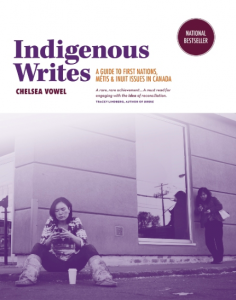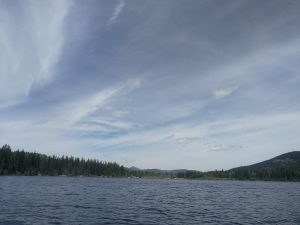Welcome to my Blog 🙂
My name is Nicole Diaz, I’m a fourth-year bachelors of science student at UBC Okanagan, majoring in Psychology. That being said you, may be wondering how I ended up here, in an online English course of all places. I took an interest in Canadian literature after taking a course in Indigenous studies. We focused a lot in that class on the biases of different authors by looking at the things they say (or omit saying) and more importantly how they say them. Should you ever get the chance to read Indigenous Writes by Chelsea Vowel (its available in UBC’s Library), I would highly recommend it. In the very beginning of the book she explores how some authors do and don’t use capitalization (writing indigenous instead of Indigenous) and the impact it has on the perception of what, and who, they are writing about.

In this course, I’m expecting to be able to look at the readings in a similar way and be able to have discussions about the different perspectives. A favourite artist of mine, Kristine Flaherty (more commonly known as K.Flay) wrote and sang the lyric: “I tried to write a book but I misunderstood what I had seen and so the story made no sense. Stories all depend on whose perspective you prefer, is it an I or is it her?” Canadian Literature is a fascinating thing to explore, as it really does depend on the perspective of the writer.
Autumn Peltier, a Wiikwemkoong First Nation, gave an inspiring speech to the United Nations addressing the issue of clean water. In her speech she said she’s been taught traditional knowledge from an early age. I’ve learnt that much First Nations knowledge is passed down through their oral traditions, so I will find it interesting to see if in the readings of this course the First Nations perspective is present.
I hope to have the opportunity of connecting with fellow students in this online platform. I’m getting the impression blogging is new for a lot of us, myself included, so this should be fun!

Works cited:
Vowel, Chelsea. Indigenous Writes : A Guide to First Nations, Métis, and Inuit issues in Canada, Portage & Main Press, 2016. ProQuest Ebook Central, https://ebookcentral.proquest.com/lib/ubc/detail.action?docID=4832580.
“Its Just a Lot”, YouTube, uploaded by K.Flay, 11 December 2018, https://www.youtube.com/watch?v=YZ_3UsOIzfw.
Hanson, Erin. “Oral Traditions.” Indigenousfoundations, https://indigenousfoundations.arts.ubc.ca/oral_traditions/.
“’We Can’t Eat Money or Drink Oil,’ Autumn Peltier Tells UN | CBC News.” CBCnews, CBC/Radio Canada, 28 Sept. 2019, https://www.cbc.ca/news/world/canadian-indigenous-water-activist-autumn-peltier-addresses-un-on-clean-water-1.5301559
Eva Dvorak
January 13, 2020 — 12:54 pm
Hi Nicole,
I really enjoyed reading your blog post. I think that your consideration of the biases that an author may have is an important skill that will be particularly relevant in this course. I will have to try to do the same as I examine Canadian literature this term.
Your mention of Indigenous oral traditions caught my attention and curiosity. It made me wonder about how we share Indigenous knowledge and stories that are usually told through oral traditions.
Do you think that the knowledge and stories usually shared through oral tradition can (or should) be shared in literature? Or perhaps video or audio recordings would be more representative of how the story or knowledge should be shared?
The Indigenous Peoples Atlas of Canada has a really informative page on oral traditions (https://indigenouspeoplesatlasofcanada.ca/article/oral-tradition/). It mentions that many oral traditions have been printed now. The article also acknowledges that historical events and policies have disturbed the sharing of some oral traditions, potentially indicating at a reason that recording oral traditions (either in literature, video, or audio form) is important.
I am interested to hear what you (and maybe some of our peers) think about this.
-Eva Dvorak
Works Cited:
“Oral Tradition.” Indigenous Peoples Atlas of Canada, https://indigenouspeoplesatlasofcanada.ca/article/oral-tradition/.
NicoleDiaz
January 14, 2020 — 7:46 pm
Hey Eva!
I do think that some type of record – whether it be written or recorded – is very important for the continuation of knowledge. I would imagine that some things are better said than written, especially when there are situations in which a story could be told in a language we don’t necessarily have the words for. It is my opinion that in some cases, there is an element that is sometimes lost when you write a story down, which is to say the emotion of a story could be lost in the translation. I like that you mentioned how in history there have been times where oral traditions have been lost (or are now at a risk of being lost), since it speaks to how Indigenous groups have been treated since the first European settlers came to Canada. I would also like to hear if anyone else has opinions on this!
Thanks for sharing your thoughts
ClaireTaylor
January 13, 2020 — 7:16 pm
Hello! Interesting point about the capitalization of ‘Indigenous’ and how authors can choose whether or not to recognize Indigenous as a word that is deserving of capitalization. In my past readings, I have never read the word Indigenous as uncapitalized, and have had professors pause their lecture to remind students to capitalize the term in their notes and/or papers. This thought begs to ask the question if authors/researchers/historians are writing on the topic of Indigenous cultures or peoples, why do some of them find it unnecessary to capitalize the ‘I’? I believe it to be a symbol of basic respect and recognition, so it’s surprising to me that someone writing about this would choose not to capitalize. Also, that’s a gorgeous picture of BC! I absolutely love camping in provincial parks here!
NicoleDiaz
January 14, 2020 — 7:39 pm
Hi Claire! Thanks for your comment 🙂 It wasn’t until I read the book by Chelsea Vowel that I realized how often words like Indigenous didn’t get capitalized, like you I can’t remember ever seeing it in all lower case. However, I must admit it is not something that, up until recently, I paid much attention to. Theres definitely been an increase in awareness especially in academia, if you look at the comment from Katarina she has two really good sources on it! I would imagine that when authors/researchers/historians omit using the proper capitalization, it is due to either a lack of awareness of what they are doing, or perhaps they do not see Indigenous peoples or groups as being of the same status of a different group that would. Like you said, it’s a sign of respect, so it could very well be because in Canadian history, there are times where that respect was certainly not present.
Thanks again!
JosephUm
January 13, 2020 — 7:37 pm
Hi Nicole!
It is really fascinating that you decided to learn more about Canadian literature.
But what would your opinion be with writers using, or not using, capitalization in their works?
I hope to hear from you soon.
NicoleDiaz
January 14, 2020 — 7:31 pm
Hey Joseph!
In my opinion, the use of capitalization is a sign of acknowledgment and respect. So when a writer choses to not capitalize, it could be because they either a) do not see the group they are talking about worthy of a proper title, or b) they do not respect that Indigenous peoples have the same status as any other group that would be capitalized. Theres definitely a lot to think about when it comes to the little details like this, because whether people are aware of it or not, we all have implicit biases, and it is in expressions like this that they become more evident.
Thanks for the comment!
Katarina
January 13, 2020 — 10:09 pm
Hi Nicole! It is nice to connect with a fellow student with a science background! Thanks for providing this introduction to yourself and the course. I am curious to read the book you recommended, so thank you for that.
I wanted to make a comment about what you said about Indigenous histories being oral histories. Last term, I took a history course focusing on the Invention of Canada, and during it, we discussed how in the field of academic history, there has been a shift in recent years for Canadian historians to include oral histories in their writing and their citations. Before this push for including oral stories, the Indigenous perspective was often left out, simply because they weren’t accessing it during their research (because it is not written in a book or in a journal). Now, there is a general expectation that historians consult and use Indigenous stories in their writing.
This article: https://academicmatters.ca/bringing-indigenous-viewpoints-to-higher-education/ talks a little bit more about Bringing Indidgenous Perspectives to Higher Education – I found some of the answers interesting.
I’m wondering, from what I know, in some aspects UBCO has “Indigenized” the curriculum much more than UBC Vancouver (https://ok.ubc.ca/okanagan-stories/indigenous-voices/), have you had the opportunity to explore Indigenous perspectives in many of your courses? I’m especially wondering about those courses that are not history or Canadian studies courses where inclusion might be more obvious.
Thanks!
NicoleDiaz
January 14, 2020 — 7:26 pm
Hi Katarina! Thanks so much for the comment 🙂 Up until this term, I’ve really only been taking science courses and as such the Indigenous studies course I had was my first real experience exploring Indigenous perspectives, but it definitely peaked my interest. We were quite lucky in the course to have guest lecturers come in and funny enough, Richard Armstrong was one of them. He’s in the Traditional Welcome to the Okanagan video on the second link you posted! I’ve also learned about the shift to include, but theres a lot of history that was lost along the way, so it will be interesting to see how (or if) it will be reconciled.
Thanks for connecting!
Katarina smith
January 15, 2020 — 12:29 am
Thanks for your reply and providing more information!
MeganCameron
January 21, 2020 — 2:48 pm
Hi Nicole!!
Small world getting to be in the same online class!!
Look forward to getting to know the school you!
Megan